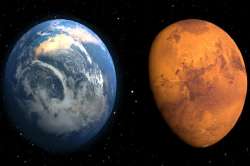Stargazers witness yet another celestial marvel as Mars comes closest to Earth for first time in 15 years
Mars, the fourth planet from the Sun approached 57.6 kilometres from the Earth, the closest it has been since 2003

Days after the Total Lunar Eclipse phenomenon stargazers all across the world on Tuesday night witnessed yet another celestial marvel on Tuesday when Mars, the fourth planet of the Solar System, came closest to Earth for the first time in 15 years.
Mars, the fourth planet from the Sun approached 57.6 kilometres from the Earth on Tuesday, the closest it has been since 2003 when it came within 55.7 million kilometres, which as the nearest in almost 60,000 years.
Earlier on July 27, the Red Planet reached 'opposition' with the Sun. Now what is 'Opposition'? Mars and Earth both orbit the sun, but at different distances, and thus, different speeds. Every two years or so, Mars, Earth and the sun form a straight line during the course of their orbits, with Earth in the middle — an event known as 'opposition'.
Also, because Mars is directly opposite the sun during opposition, it rises as the sun sets, and it sets as the sun rises. As a result, the Red Planet shines prominently in our night sky.
In addition, this year, Mars will reach what is called "perihelic opposition". Perihelion refers to the point in Mars' orbit when it's closest to the sun. Therefore, when Mars is closest to the sun, it is even closer to Earth during opposition.
Experts have recommended he use of a telescope, fitted with a lens with a 6-inch aperture, to witness the phenomenon. According to NASA, this event will not be witnessed again before 2034, when the next Mars inversion is predicted.
Mars which is already brighter than usual, shined even more and appeared be bigger on Tuesday.
Mars gets closest to Earth on July 31
The 'red' planet rose from the Gemini constellation in India and it was visible with naked eye. There is presently a planet-wide dust storm on Mars, a phenomenon that is said to occur when the planet is closest to the sun in its orbit.